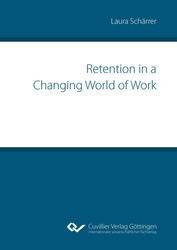| Areas | |
|---|---|
| Serie de libros (96) |
1381
|
| Nachhaltigkeit |
3
|
| Gesundheitswesen |
1
|
| Letra |
2370
|
| Medienwissenschaften | 16 |
| Teología | 57 |
| Filosofía | 102 |
| Derecho | 424 |
| Economía | 851 |
| Ciencias sociales | 418 |
| Ciencias del deporte | 48 |
| Psicología | 233 |
| Educación | 190 |
| Historia | 183 |
| Arte | 111 |
| Ciencias culturales | 166 |
| Literatur | 117 |
| Lingüística | 88 |
| Ciencias Naturales |
5408
|
| Ciencias Ingeniería |
1795
|
| General |
98
|
|
Leitlinien Unfallchirurgie
5. Auflage bestellen |
|
Erweiterte Suche
Retention in a Changing World of Work (Tienda española)
Laura Schärrer (Autor)Previo
Lectura de prueba, PDF (130 KB)
Indice, PDF (26 KB)
Over the last decades, the world of work has undergone considerable changes. Although such changes are not new to the labor market, the economy has increasingly become a more complex and dynamic environment. Several drivers, such as demographic change, technological change, and globalization, lead to a changing world of work that results in various groups of employees with individual needs and aspirations. Consequently, organizations face the challenge of retaining these individuals, to ensure a qualified workforce and to gain competitive advantage.
The aim of Laura Schärrer’s dissertation was to examine the retention of three groups of employees that have increasingly emerged through changes in the context of work. Specifically, the three empirical studies shed light on the question of whether and how the psychological contract can enhance the retention of young, gig, and migrant workers.
| ISBN-13 (Impresion) | 9783736975491 |
| ISBN-13 (E-Book) | 9783736965492 |
| Formato | A5 |
| Idioma | Inglés |
| Numero de paginas | 130 |
| Laminacion de la cubierta | Brillante |
| Edicion | 1. |
| Lugar de publicacion | Göttingen |
| Lugar de la disertacion | Luzern |
| Fecha de publicacion | 15.12.2021 |
| Clasificacion simple | Tesis doctoral |
| Area |
Economía
Teoría de la empresa |
| Palabras claves | Human resource management, retention, employer branding, psychological contract, psychological contract breach, psychological contract fulfillment, young worker, gig worker, migrant worker, turnover intention, norm of reciprocity, social exchange theory, expectations, cohort, t-test, gig economy, independent contractors, work volition, factorial study, climate for inclusion, cultural distance, moderated mediation, Verwaltung der Humanressourcen, Humanressourcen, Arbeitgebermarkenbildung, psychologisches Gutachten, psychologischer Vertragsbruch, psychologische Vertragserfüllung, junger Arbeiter, Gastarbeiter, Umsatzabsicht, Gegenseitigkeitsnorm, soziale Austauschtheorie, Erwartungen, unabhängige Vertragspartner, Arbeitswille, faktorielle Studie, Integrationsklima, kulturelle Distanz, moderierte Schlichtung, Korrelationskoeffizient nach Pearson, Pearson correlation coefficient, Wanderarbeiter, Arbeitsmigranten, Arbeitsmarkt, labor market, Wandel der Arbeitswelt, changing world of work, demografischer Wandel, demographic change, technologischer Wandel, technological change, Informationstechnologie, information-technology, Mobilität, mobility, Globalisierung, globalization, Interdependenz von Volkswirtschaften, interdependence of economies, formelles Arbeitsverhältnis, formal employment relationship, Lebensstil, lifestyle, Arbeitsmarktbedingungen, labor market conditions, Mitarbeiterbindung, Wettbewerbsvorteile,competitive advantage, Wettbewerb, Marketingkonzept, marketing concept, zielgruppenorientierte Segmentierung des Arbeitsmarktes, group-oriented segmentation of the labor market, Fluktuation, Arbeitsplatzsicherheit, job security, Talentmanagement, talent management |








